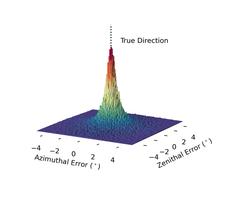IceCube kaggle competition ended
The kaggle competition ended on April 19, 2023. Results are in.
The kaggle competition IceCube - Neutrinos in Deep Ice ended on April 19 2023, with over eleven thousand entries by 901 participants. During the three months competition phase this project attracted active participants from 74 countries, and overall counted 6460 registrants.
The leaderboard has since been verified and finalized, and the winners are announced:
1st Place, winner of $18k: Team “Tito” (https://www.kaggle.com/its7171)
2nd Place, winners of $12k: Team “IceMix” (https://www.kaggle.com/drhabib, https://www.kaggle.com/iafoss)
3rd Place, winner of $10k: Team “GPUs on Ice” (https://www.kaggle.com/dipamc77)
Details on winning solutions:
The top 3 placements share in common, that they all apply so-called “transformers”, which is the same architectures that powers the latest generation of large language models such as chatGPT. This is a new technique used on IceCube data, and surpasses the quality of previous machine learning based reconstructions significantly. All top 3 solutions are able to reconstruct the direction of “track” events (neutrino events that contain an elongated signature caused by a muon from the interaction) to sub-degree resolution. This likely opens new possibilities to apply these algorithms to vast numbers of events, if not the entire IceCube data stream at once. Such high precision was until now reserved for select neutrino event candidates that needed to be processed with computationally intensive methods, taking easily minutes to hours per event. In contrast, the methods developed during this kaggle competition are blazing fast, and can be applied to millions of events within just a few hours.
Figure: Example visualization from the top 3 solutions: Shown is the distribution of the reconstructed directions in terms of the two angles “azimuth” and “zenith” in degree, with the true direction lying at the center (0,0). The visualization includes all events from the test dataset from the completion (~1 Mio. Neutrinos).

